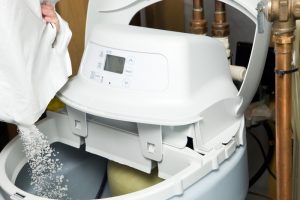 One of the important services we offer to our customers is the installation of water softeners. A water softener in Mason, OH is the best way to counteract the common problem with water hardness in the area. We live in a region that has among the highest levels of water hardness in the country, from 181 to 250 milligrams of calcium carbonate per liter of water. As a comparison, water that has less than 60 mg per liter is considered “soft.”
One of the important services we offer to our customers is the installation of water softeners. A water softener in Mason, OH is the best way to counteract the common problem with water hardness in the area. We live in a region that has among the highest levels of water hardness in the country, from 181 to 250 milligrams of calcium carbonate per liter of water. As a comparison, water that has less than 60 mg per liter is considered “soft.”
This high concentration of hard water minerals (which also includes gypsum and magnesium) wreaks havoc on plumbing systems. The build-up of scale inside pipes causes an increase in water pressure, high incidence of leaks, and frequent clogging. Scale can also damage water-using appliances; the water heater is especially at risk. Water hardness creates nuisances inside a home, leaving a film on surfaces, causing fabrics to fade in the wash, and making it difficult to get rid of soap residue from showering and bathing.
But why does this happen? Where is this hard water coming from that makes water softeners a necessity in many homes?
The Answer: Ground Seepage
Water is an excellent solvent for calcium and magnesium, so as long as these minerals are present in the soil near the water, it’s easy for them to get into the water through seepage. There is a large amount of calcium and magnesium in our soil. As groundwater seeps through the minerals it develops hardness, and this can then enter the municipal plumbing pipes. This is why municipal water treatment plants can’t always stop water hardness: the water can still pick up the minerals on the way to residential buildings.
Local municipalities are always taking steps to soften water because of the damage hard water minerals can do to the whole plumbing system—but it still gets to many homes. If you have noticed the signs of hard water in your house (film on glass surfaces, trouble creating soap lather, white flaky residue on fixtures), the best way to deal with it is to call our professionals to install a water softener.
The Water Softener Solution
Water softeners are placed on the water main so all the water entering the home must pass through it. The water is sent through a chamber filled with resin beads covered with a solution of water and sodium. The sodium ions on the beads are charged so they will change places with the hard water ions (ion exchange). The beads pick up the magnesium and calcium, and the water picks up the sodium, become “soft.” An occasional recharge cycle sends water from a brine tank to remove the hard water ions and place sodium ions on the beads again.
You can’t purchase a water softener on your own and install it. Professionals must ensure you have the right size of water heater for your needs. Otherwise, you may have water that has excess sodium in it, or water that isn’t soft enough. Trust to our water treatment specialists to take care of your home’s hard water issues.
Ken Neyer Plumbing, Inc. has served Cincinnati and the surrounding Tri State Area since 1972.
